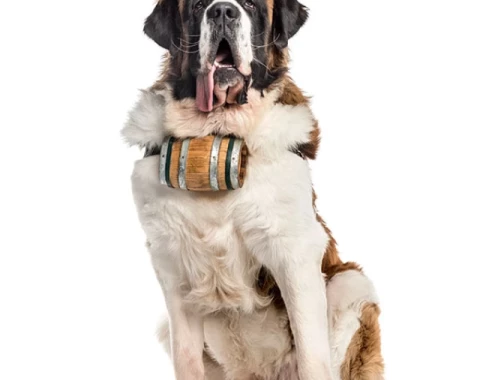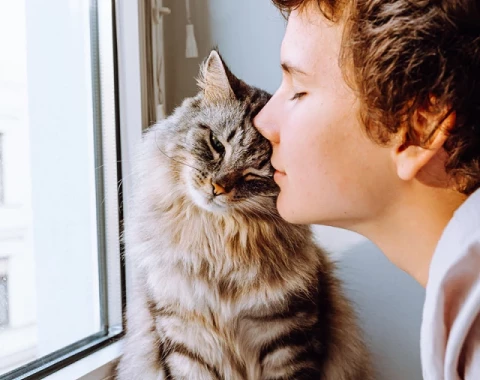Why Dogs Eat Poop: Causes and How to Prevent This Behavior
2024-01-04
Hunde

Many dog owners have certainly encountered the surprising behavior of their pet - eating feces. This behavior may seem not only unpleasant, but also mysterious. Why do dogs choose to do this? There are several potential causes that can be investigated to understand this behavior and take steps to prevent it.
Lack of Food: One of the most common reasons why dogs eat poop may be due to not having enough food. If a dog is not getting enough nutrients in its diet, it may try to compensate by eating feces. It's a good idea to consult with your veterinarian to adjust your dog's diet and make sure it meets all his nutritional needs.
Instinctive Behavior: There is a theory that eating feces may have an instinctive basis, especially in the wild ancestors of dogs. In the wild, mothers often eat their pups' feces to hide the presence of their young from predators. At home, this instinct may still be present, prompting the dog to behave similarly.
Eating Disorders: Some dogs may suffer from gastrointestinal disorders that affect their ability to absorb nutrients. As a result, they may seek alternative food sources, including feces. Examining possible health problems related to your dog's digestive system can help identify and treat such conditions.
Boredom and Anxiety: Lack of physical and mental activity can lead to boredom in your dog. Eating feces may be one manifestation of this concern. Owners should ensure that their dog gets enough activity and provides them with toys and mental stimulation to minimize the risk of this behavior occurring.
Territorial Behavior: Some dogs may eat other animals' droppings to mark their territory. This behavior may be caused by the need to establish dominance and mark the area in which they are staying.
How can this behavior be prevented?
Diet: Providing your dog with a balanced, nutrient-rich diet can reduce the urge to eat poop.
Physical Activity: Regular physical activity will help your dog burn off excess energy and minimize boredom.
Environmental Control: Monitoring your dog's surroundings, especially during walks, will help you avoid situations where your dog may eat feces.
Training: Implementing effective training can help prevent this behavior. It is worth consulting with an experienced dog trainer.
Visit to the Vet: If your dog still tends to eat feces, it is worth consulting a vet to rule out possible health problems.
Remember that each dog is different and the reasons for its behavior may vary. Monitoring your pet regularly and adapting its environment and diet can help minimize the risk of this unwanted behavior.
Lack of Food: One of the most common reasons why dogs eat poop may be due to not having enough food. If a dog is not getting enough nutrients in its diet, it may try to compensate by eating feces. It's a good idea to consult with your veterinarian to adjust your dog's diet and make sure it meets all his nutritional needs.
Instinctive Behavior: There is a theory that eating feces may have an instinctive basis, especially in the wild ancestors of dogs. In the wild, mothers often eat their pups' feces to hide the presence of their young from predators. At home, this instinct may still be present, prompting the dog to behave similarly.
Eating Disorders: Some dogs may suffer from gastrointestinal disorders that affect their ability to absorb nutrients. As a result, they may seek alternative food sources, including feces. Examining possible health problems related to your dog's digestive system can help identify and treat such conditions.
Boredom and Anxiety: Lack of physical and mental activity can lead to boredom in your dog. Eating feces may be one manifestation of this concern. Owners should ensure that their dog gets enough activity and provides them with toys and mental stimulation to minimize the risk of this behavior occurring.
Territorial Behavior: Some dogs may eat other animals' droppings to mark their territory. This behavior may be caused by the need to establish dominance and mark the area in which they are staying.
How can this behavior be prevented?
Diet: Providing your dog with a balanced, nutrient-rich diet can reduce the urge to eat poop.
Physical Activity: Regular physical activity will help your dog burn off excess energy and minimize boredom.
Environmental Control: Monitoring your dog's surroundings, especially during walks, will help you avoid situations where your dog may eat feces.
Training: Implementing effective training can help prevent this behavior. It is worth consulting with an experienced dog trainer.
Visit to the Vet: If your dog still tends to eat feces, it is worth consulting a vet to rule out possible health problems.
Remember that each dog is different and the reasons for its behavior may vary. Monitoring your pet regularly and adapting its environment and diet can help minimize the risk of this unwanted behavior.
:
RaV




